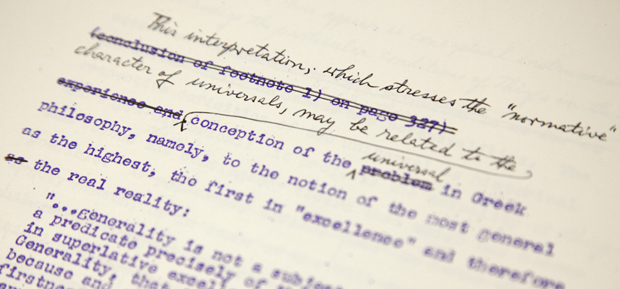Discovered manuscript shows Marcuse’s evolution
Draft of the former politics professor's 'One-Dimensional Man' at Brandeis archives

For scholars, the discovery of a long-forgotten manuscript is the academic equivalent of hitting the jackpot. Such a find can ignite years of discussion and renewed interest in the author and the work.
The recent unearthing of a draft of a classic text, “One-Dimensional Man,” by former Brandeis politics professor Herbert Marcuse (1898-1979) promises to spark the kind of heated debate among academics, students and fellow thinkers for which Marcuse, a Marxist, was legendary and, in some quarters (even at Brandeis), notorious.
A dark critique of contemporary American society written in the shadow of the Cold War and the growing Vietnam conflict, “One-Dimensional Man” has been a staple of syllabuses in politics, sociology and philosophy classes since its publication in 1964. At Brandeis, sociologist Laura Miller discusses a chapter in her “Culture of Consumption” class, while intellectual historian Eugene Sheppard has used sections of the book in his Near Eastern and Judaic studies class “Divided Minds.”
The draft manuscript was recently discovered after Patrick Gamsby, academic outreach librarian for the humanities, visited the Goldfarb Library’s archives in search of something Marcusian to help celebrate next year’s 50th anniversary of the publication of “One-Dimensional Man” at a Brandeis symposium on the German Jewish intellectual.
At Gamsby’s request, Sarah Shoemaker, associate university librarian of the Robert D. Farber University Archives and Special Collections, “dove deeply into their databases, ones not accessible to the public and rarely queried,” he says, and came up with an electronic note about a Marcuse manuscript tucked away offsite in a cardboard box marked “Misc. Manuscripts.”
A Marcuse devotee, Gamsby was ecstatic when the box was retrieved from storage and he unexpectedly pulled out two thick black folders tied with string, each holding about 200 pages of typewritten manuscript of unknown date. Text revisions — some just single words, some entire sentences — were carefully penned between the lines. The first folder also contained Marcuse’s bookplate, inscribed “A Gift for Brandeis University.”
“Without a doubt, this early manuscript is the best possible item I could have come across in my search for Marcuse materials here at Brandeis,” says Gamsby. “It was definitely a Eureka moment for me.”
Although the provenance of the manuscript is still unclear, Gamsby thinks it is possible Marcuse gave the manuscript to Brandeis in 1965, the year he retired from the faculty. The draft bears notable changes from the published work, including, according to Gamsby and others, a starker opening but a more hopeful conclusion about the future of culture.
Marcuse was not known for his sunny philosophical outlook. A member of the Frankfurt School of critical theory, he condemned capitalism and what he saw as the soul-destroying aspects of a technology-driven culture of mass entertainment and mass consumption — a phenomenon that has seemingly accelerated in the decades since “One-Dimensional Man” came out. “He would say we’re in even greater thrall to these forces today,” Miller says.
“Marcuse worried about this eclipse of the human imagination,” says Sheppard. “He asks a basic question: Given that we live in a society of such abundance and technical sophistication, why is it that our freedom seems to get more and more encumbered?”
Born and educated in Germany, Marcuse fled Nazi persecution in 1934 and settled in the United States. Following stints at Columbia and Harvard, he joined Brandeis’ politics department in 1954, becoming “the most influential and widely known of the social scientists,” writes founding president Abram L. Sachar in “Brandeis University: A Host at Last.”
Despite accusations that he was prolix and ponderous — with no ready actionable remedy for social ills — Marcuse deeply inspired the New Left and countless students across the country and at Brandeis, including political activist Angela Davis ’65, who became his protégé and a leading force in the radical student movement of the 1960s.
“I find it amazing that a relatively obscure Hegelian philosopher from Germany writes a book that ends up becoming a lightning rod for rebellion, student movements and the New Left, even though it’s a very dark work and advances no clear path forward,” says Sheppard.
Scholars of intellectual history, culture, politics and philosophy will no doubt debate the evolution of Marcuse’s thinking at next year’s symposium, starting with the jewel in the crown: a newly discovered complete manuscript.
Categories: Humanities and Social Sciences, Research





